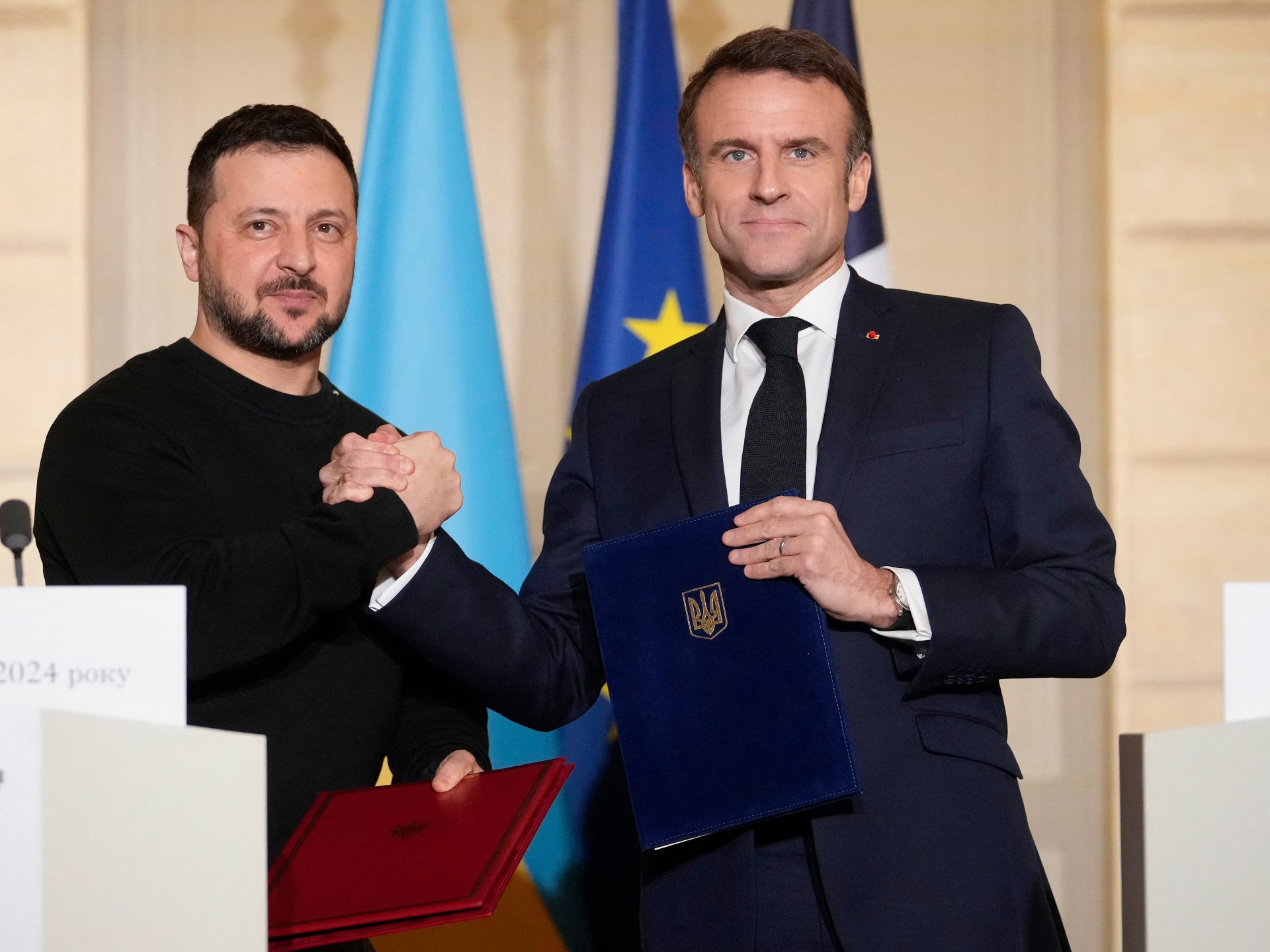Deal with France promises $3.23bn in military aid to Ukraine, while pact with Germany secures $1.22bn support package.
Ukrainian President Volodymyr Zelenskyy has signed a new long-term security pact with France, hours after securing a similar deal and aid from Germany.
France and Ukraine signed a bilateral security agreement seeking to help Kyiv in its war against Russia, the Elysee said on Friday.
Signed by Zelenskyy and French President Emmanuel Macron, the pact includes pledges from Paris to deliver more arms, train soldiers in Ukraine and send up to three billion euros ($3.23bn) in military aid.
The pact is set to run for 10 years and will not only strengthen cooperation in the area of artillery but also help pave the way towards Ukraine’s future integration into the European Union and NATO, Macron and Zelenskyy said.
“Our cooperation yields results in the protection of life in Ukraine and our entire Europe,” Zelenskyy said on his social media platforms, shortly before meeting Macron.
Париж. Запланована зустріч із Президентом Макроном і важлива угода. Наша співпраця дає результати в захисті життя України та всієї нашої Європи.
🇺🇦🇫🇷
— Volodymyr Zelenskyy / Володимир Зеленський (@ZelenskyyUa) February 16, 2024
Earlier on Friday, the German Ministry of Defence announced that a deal had been signed between Zelenskyy and Chancellor Olaf Scholz.
The German security pact, which will last for 10 years, commits Germany to supporting Ukraine with military assistance and hitting Russia with sanctions and export controls, and ensuring that Russian assets remain frozen.
Berlin also prepared another immediate support package worth 1.13 billion euros ($1.22bn) that is focused on air defence and artillery.
“The document’s importance cannot be overestimated. It makes clear that Germany will continue to support an independent Ukraine in its defence against the Russian invasion,” Scholz said.
“And if in the future there is another Russian aggression, we have agreed on detailed diplomatic, economic and military support,” he added.
Avdiivka
Zelenskyy’s visit to France and Germany is part of his mini-European tour where he was attempting to secure much-needed aid for Ukraine as Russia’s war in the country rages on, edging closer to its third year.
On Friday, Ukrainian troops were trying to hold back Russian forces closing in on the eastern town of Avdiivka.
The Ukrainian army said it was pulling back from a position on the southern outskirts of the front-line city, but that its forces were taking up “new positions”.
Avdiivka, which Russia has been trying to capture since October, is a main target for Moscow ahead of the second anniversary of the start of the Ukraine war.
To tackle battlefield challenges, Ukraine has been facing a shortage of ammunition stockpiles amid delays in Western military assistance.
“We are doing everything we can to ensure that our warriors have enough managerial and technological capabilities to save as many Ukrainian lives as possible,” Zelenskyy said on arriving in Germany.
In January, UK Prime Minister Rishi Sunak also signed a security accord with Ukraine.
Meanwhile, across the pond in Washington, DC, US President Joe Biden has repeatedly been stressing the importance of sending more aid to Ukraine.
On Tuesday, the US Senate passed a $61bn aid bill for Ukraine. But the bill still faces an uncertain fate with several right-wing US Republicans in the House already saying they will block it as the money should be spent on domestic issues.
On Friday, Biden highlighted that the reported death of Russian anticorruption activist Alexey Navalny brings new urgency to the need for Congress to approve funds for Ukraine to stave off Moscow’s invasion.
“The failure to support Ukraine at this critical moment will never be forgotten,” Biden said. “And the clock is ticking. This has to happen. We have to help now.”
Check out our Latest News and Follow us at Facebook
Original Source

